Global Business Environment Analysis: Vodafone Strategic Challenges
VerifiedAdded on 2022/12/29
|15
|4977
|79
Report
AI Summary
This report provides a comprehensive analysis of the global business environment, examining the key drivers of globalization such as technological advancements, political factors, market dynamics, cost considerations, and competitive pressures. It delves into the strategic challenges faced by global businesses, including communication difficulties, cultural differences, legal complexities, international company structures, and cost calculations. The report evaluates the impact of globalization on organizational governance, leadership, structure, function, and culture, using Vodafone as a case study to illustrate these concepts. Furthermore, it explores various market entry strategies and decision-making processes in an international context, along with an analysis of the barriers to globalization and recommendations for overcoming them. The report culminates in a critical evaluation of strategies that organizations like Vodafone can adopt to succeed in the global market.

Global Business
Environment
Environment
Paraphrase This Document
Need a fresh take? Get an instant paraphrase of this document with our AI Paraphraser
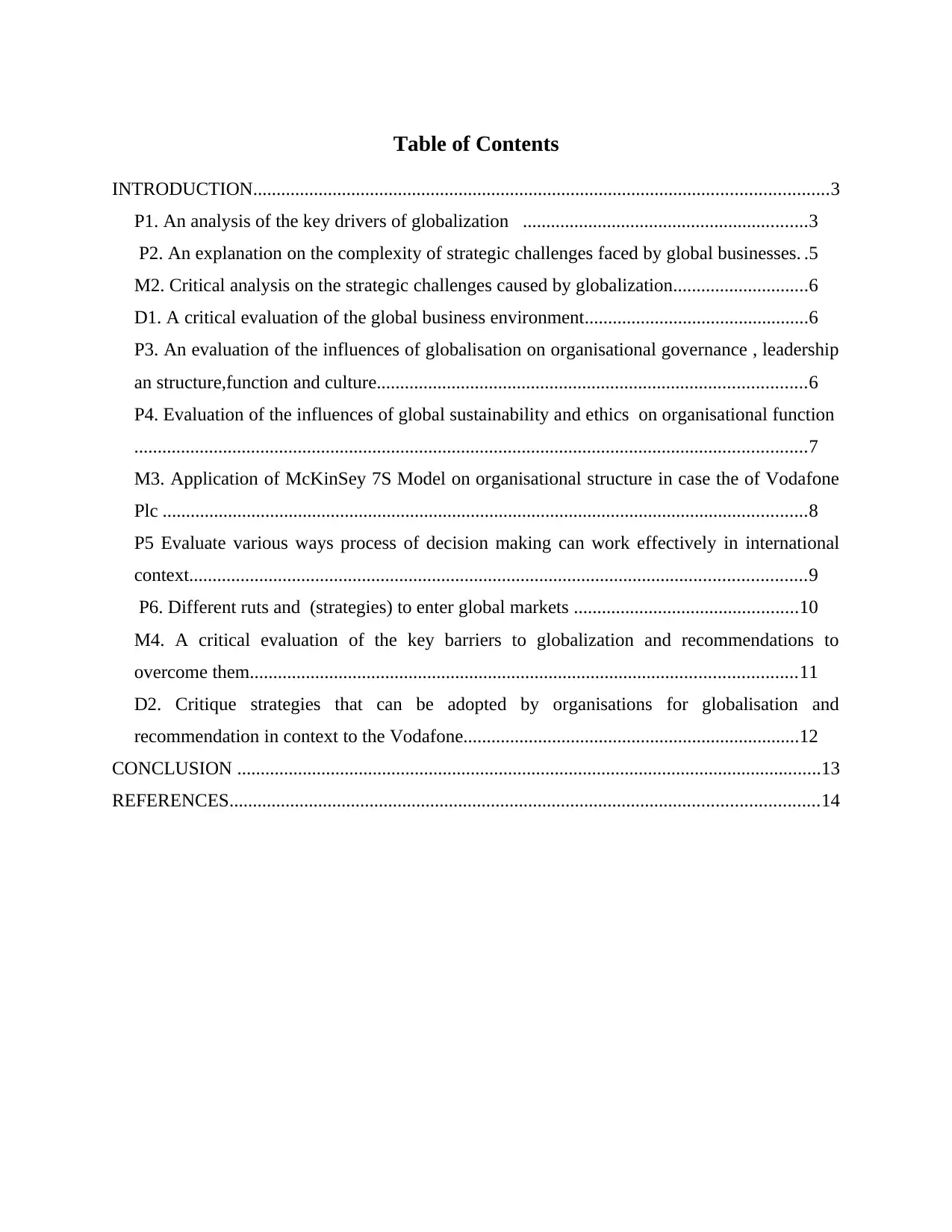
Table of Contents
INTRODUCTION...........................................................................................................................3
P1. An analysis of the key drivers of globalization .............................................................3
P2. An explanation on the complexity of strategic challenges faced by global businesses. .5
M2. Critical analysis on the strategic challenges caused by globalization.............................6
D1. A critical evaluation of the global business environment................................................6
P3. An evaluation of the influences of globalisation on organisational governance , leadership
an structure,function and culture............................................................................................6
P4. Evaluation of the influences of global sustainability and ethics on organisational function
................................................................................................................................................7
M3. Application of McKinSey 7S Model on organisational structure in case the of Vodafone
Plc ..........................................................................................................................................8
P5 Evaluate various ways process of decision making can work effectively in international
context....................................................................................................................................9
P6. Different ruts and (strategies) to enter global markets ................................................10
M4. A critical evaluation of the key barriers to globalization and recommendations to
overcome them.....................................................................................................................11
D2. Critique strategies that can be adopted by organisations for globalisation and
recommendation in context to the Vodafone........................................................................12
CONCLUSION .............................................................................................................................13
REFERENCES..............................................................................................................................14
INTRODUCTION...........................................................................................................................3
P1. An analysis of the key drivers of globalization .............................................................3
P2. An explanation on the complexity of strategic challenges faced by global businesses. .5
M2. Critical analysis on the strategic challenges caused by globalization.............................6
D1. A critical evaluation of the global business environment................................................6
P3. An evaluation of the influences of globalisation on organisational governance , leadership
an structure,function and culture............................................................................................6
P4. Evaluation of the influences of global sustainability and ethics on organisational function
................................................................................................................................................7
M3. Application of McKinSey 7S Model on organisational structure in case the of Vodafone
Plc ..........................................................................................................................................8
P5 Evaluate various ways process of decision making can work effectively in international
context....................................................................................................................................9
P6. Different ruts and (strategies) to enter global markets ................................................10
M4. A critical evaluation of the key barriers to globalization and recommendations to
overcome them.....................................................................................................................11
D2. Critique strategies that can be adopted by organisations for globalisation and
recommendation in context to the Vodafone........................................................................12
CONCLUSION .............................................................................................................................13
REFERENCES..............................................................................................................................14
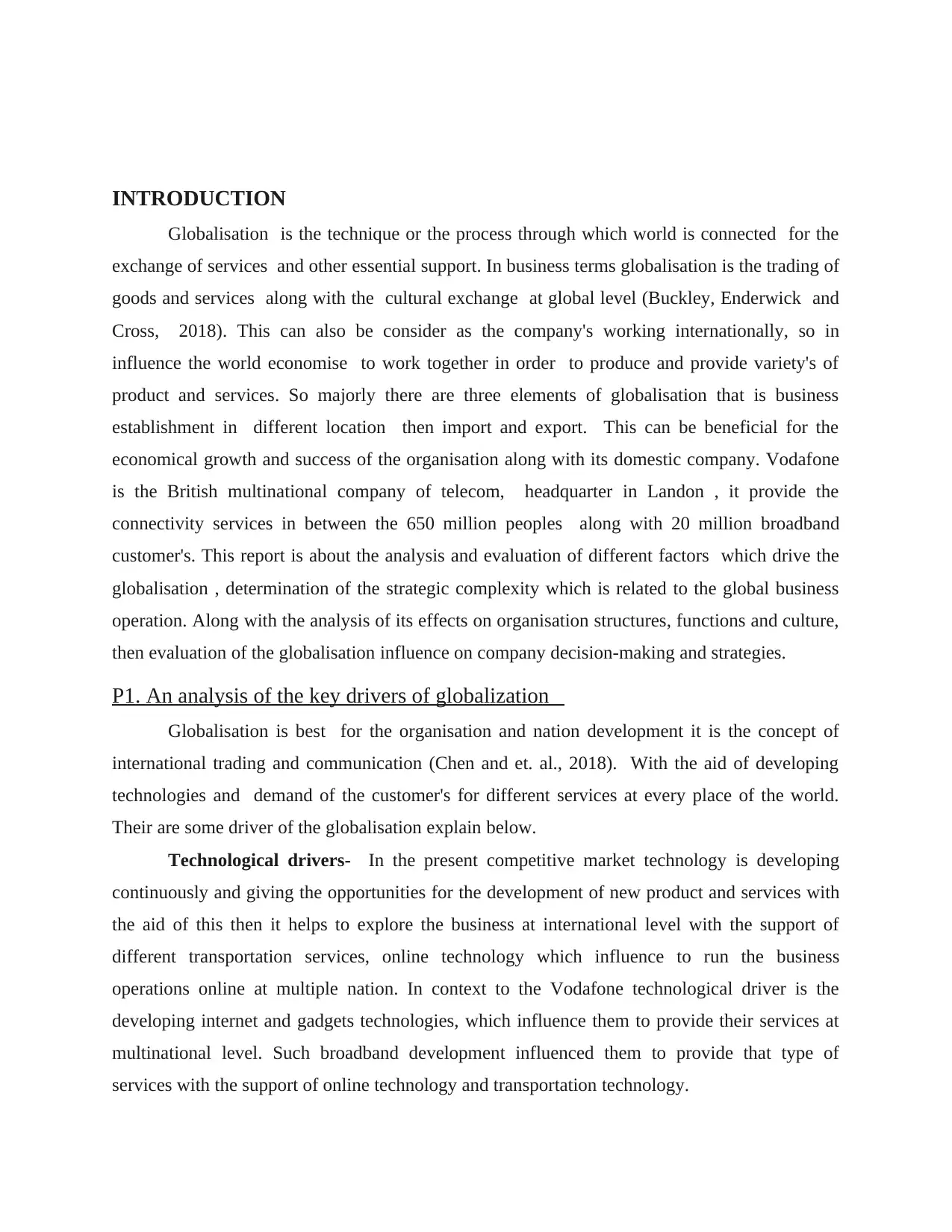
INTRODUCTION
Globalisation is the technique or the process through which world is connected for the
exchange of services and other essential support. In business terms globalisation is the trading of
goods and services along with the cultural exchange at global level (Buckley, Enderwick and
Cross, 2018). This can also be consider as the company's working internationally, so in
influence the world economise to work together in order to produce and provide variety's of
product and services. So majorly there are three elements of globalisation that is business
establishment in different location then import and export. This can be beneficial for the
economical growth and success of the organisation along with its domestic company. Vodafone
is the British multinational company of telecom, headquarter in Landon , it provide the
connectivity services in between the 650 million peoples along with 20 million broadband
customer's. This report is about the analysis and evaluation of different factors which drive the
globalisation , determination of the strategic complexity which is related to the global business
operation. Along with the analysis of its effects on organisation structures, functions and culture,
then evaluation of the globalisation influence on company decision-making and strategies.
P1. An analysis of the key drivers of globalization
Globalisation is best for the organisation and nation development it is the concept of
international trading and communication (Chen and et. al., 2018). With the aid of developing
technologies and demand of the customer's for different services at every place of the world.
Their are some driver of the globalisation explain below.
Technological drivers- In the present competitive market technology is developing
continuously and giving the opportunities for the development of new product and services with
the aid of this then it helps to explore the business at international level with the support of
different transportation services, online technology which influence to run the business
operations online at multiple nation. In context to the Vodafone technological driver is the
developing internet and gadgets technologies, which influence them to provide their services at
multinational level. Such broadband development influenced them to provide that type of
services with the support of online technology and transportation technology.
Globalisation is the technique or the process through which world is connected for the
exchange of services and other essential support. In business terms globalisation is the trading of
goods and services along with the cultural exchange at global level (Buckley, Enderwick and
Cross, 2018). This can also be consider as the company's working internationally, so in
influence the world economise to work together in order to produce and provide variety's of
product and services. So majorly there are three elements of globalisation that is business
establishment in different location then import and export. This can be beneficial for the
economical growth and success of the organisation along with its domestic company. Vodafone
is the British multinational company of telecom, headquarter in Landon , it provide the
connectivity services in between the 650 million peoples along with 20 million broadband
customer's. This report is about the analysis and evaluation of different factors which drive the
globalisation , determination of the strategic complexity which is related to the global business
operation. Along with the analysis of its effects on organisation structures, functions and culture,
then evaluation of the globalisation influence on company decision-making and strategies.
P1. An analysis of the key drivers of globalization
Globalisation is best for the organisation and nation development it is the concept of
international trading and communication (Chen and et. al., 2018). With the aid of developing
technologies and demand of the customer's for different services at every place of the world.
Their are some driver of the globalisation explain below.
Technological drivers- In the present competitive market technology is developing
continuously and giving the opportunities for the development of new product and services with
the aid of this then it helps to explore the business at international level with the support of
different transportation services, online technology which influence to run the business
operations online at multiple nation. In context to the Vodafone technological driver is the
developing internet and gadgets technologies, which influence them to provide their services at
multinational level. Such broadband development influenced them to provide that type of
services with the support of online technology and transportation technology.
⊘ This is a preview!⊘
Do you want full access?
Subscribe today to unlock all pages.

Trusted by 1+ million students worldwide
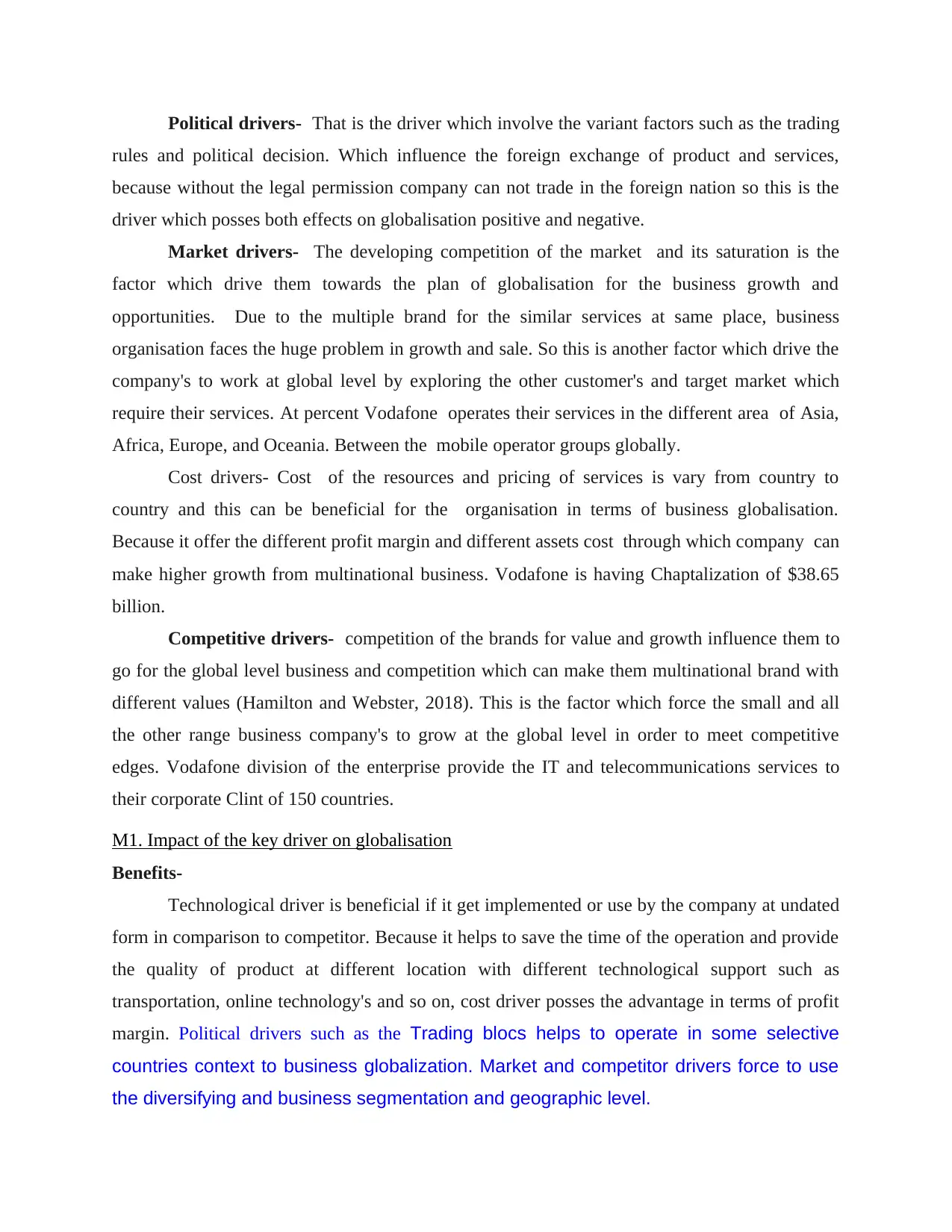
Political drivers- That is the driver which involve the variant factors such as the trading
rules and political decision. Which influence the foreign exchange of product and services,
because without the legal permission company can not trade in the foreign nation so this is the
driver which posses both effects on globalisation positive and negative.
Market drivers- The developing competition of the market and its saturation is the
factor which drive them towards the plan of globalisation for the business growth and
opportunities. Due to the multiple brand for the similar services at same place, business
organisation faces the huge problem in growth and sale. So this is another factor which drive the
company's to work at global level by exploring the other customer's and target market which
require their services. At percent Vodafone operates their services in the different area of Asia,
Africa, Europe, and Oceania. Between the mobile operator groups globally.
Cost drivers- Cost of the resources and pricing of services is vary from country to
country and this can be beneficial for the organisation in terms of business globalisation.
Because it offer the different profit margin and different assets cost through which company can
make higher growth from multinational business. Vodafone is having Chaptalization of $38.65
billion.
Competitive drivers- competition of the brands for value and growth influence them to
go for the global level business and competition which can make them multinational brand with
different values (Hamilton and Webster, 2018). This is the factor which force the small and all
the other range business company's to grow at the global level in order to meet competitive
edges. Vodafone division of the enterprise provide the IT and telecommunications services to
their corporate Clint of 150 countries.
M1. Impact of the key driver on globalisation
Benefits-
Technological driver is beneficial if it get implemented or use by the company at undated
form in comparison to competitor. Because it helps to save the time of the operation and provide
the quality of product at different location with different technological support such as
transportation, online technology's and so on, cost driver posses the advantage in terms of profit
margin. Political drivers such as the Trading blocs helps to operate in some selective
countries context to business globalization. Market and competitor drivers force to use
the diversifying and business segmentation and geographic level.
rules and political decision. Which influence the foreign exchange of product and services,
because without the legal permission company can not trade in the foreign nation so this is the
driver which posses both effects on globalisation positive and negative.
Market drivers- The developing competition of the market and its saturation is the
factor which drive them towards the plan of globalisation for the business growth and
opportunities. Due to the multiple brand for the similar services at same place, business
organisation faces the huge problem in growth and sale. So this is another factor which drive the
company's to work at global level by exploring the other customer's and target market which
require their services. At percent Vodafone operates their services in the different area of Asia,
Africa, Europe, and Oceania. Between the mobile operator groups globally.
Cost drivers- Cost of the resources and pricing of services is vary from country to
country and this can be beneficial for the organisation in terms of business globalisation.
Because it offer the different profit margin and different assets cost through which company can
make higher growth from multinational business. Vodafone is having Chaptalization of $38.65
billion.
Competitive drivers- competition of the brands for value and growth influence them to
go for the global level business and competition which can make them multinational brand with
different values (Hamilton and Webster, 2018). This is the factor which force the small and all
the other range business company's to grow at the global level in order to meet competitive
edges. Vodafone division of the enterprise provide the IT and telecommunications services to
their corporate Clint of 150 countries.
M1. Impact of the key driver on globalisation
Benefits-
Technological driver is beneficial if it get implemented or use by the company at undated
form in comparison to competitor. Because it helps to save the time of the operation and provide
the quality of product at different location with different technological support such as
transportation, online technology's and so on, cost driver posses the advantage in terms of profit
margin. Political drivers such as the Trading blocs helps to operate in some selective
countries context to business globalization. Market and competitor drivers force to use
the diversifying and business segmentation and geographic level.
Paraphrase This Document
Need a fresh take? Get an instant paraphrase of this document with our AI Paraphraser
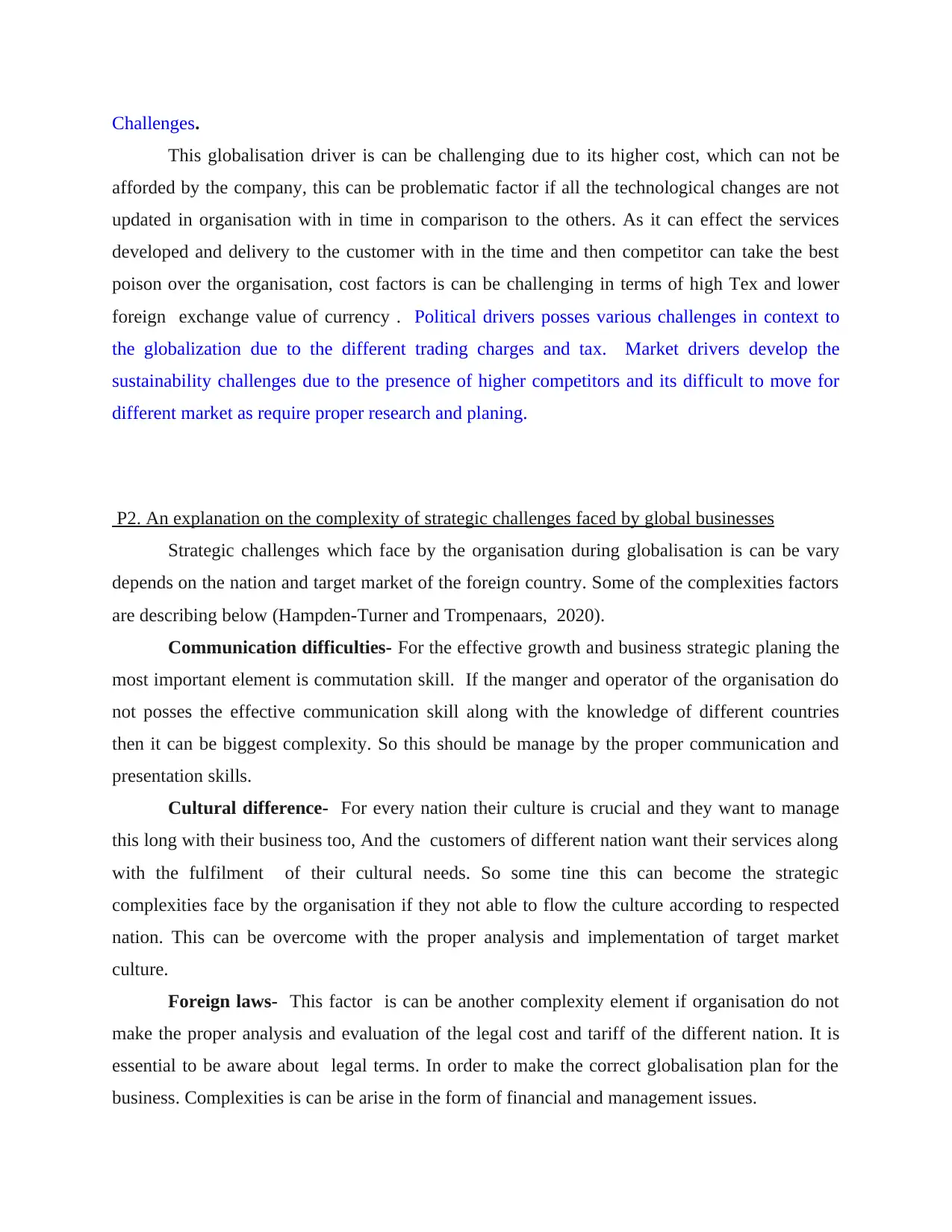
Challenges.
This globalisation driver is can be challenging due to its higher cost, which can not be
afforded by the company, this can be problematic factor if all the technological changes are not
updated in organisation with in time in comparison to the others. As it can effect the services
developed and delivery to the customer with in the time and then competitor can take the best
poison over the organisation, cost factors is can be challenging in terms of high Tex and lower
foreign exchange value of currency . Political drivers posses various challenges in context to
the globalization due to the different trading charges and tax. Market drivers develop the
sustainability challenges due to the presence of higher competitors and its difficult to move for
different market as require proper research and planing.
P2. An explanation on the complexity of strategic challenges faced by global businesses
Strategic challenges which face by the organisation during globalisation is can be vary
depends on the nation and target market of the foreign country. Some of the complexities factors
are describing below (Hampden-Turner and Trompenaars, 2020).
Communication difficulties- For the effective growth and business strategic planing the
most important element is commutation skill. If the manger and operator of the organisation do
not posses the effective communication skill along with the knowledge of different countries
then it can be biggest complexity. So this should be manage by the proper communication and
presentation skills.
Cultural difference- For every nation their culture is crucial and they want to manage
this long with their business too, And the customers of different nation want their services along
with the fulfilment of their cultural needs. So some tine this can become the strategic
complexities face by the organisation if they not able to flow the culture according to respected
nation. This can be overcome with the proper analysis and implementation of target market
culture.
Foreign laws- This factor is can be another complexity element if organisation do not
make the proper analysis and evaluation of the legal cost and tariff of the different nation. It is
essential to be aware about legal terms. In order to make the correct globalisation plan for the
business. Complexities is can be arise in the form of financial and management issues.
This globalisation driver is can be challenging due to its higher cost, which can not be
afforded by the company, this can be problematic factor if all the technological changes are not
updated in organisation with in time in comparison to the others. As it can effect the services
developed and delivery to the customer with in the time and then competitor can take the best
poison over the organisation, cost factors is can be challenging in terms of high Tex and lower
foreign exchange value of currency . Political drivers posses various challenges in context to
the globalization due to the different trading charges and tax. Market drivers develop the
sustainability challenges due to the presence of higher competitors and its difficult to move for
different market as require proper research and planing.
P2. An explanation on the complexity of strategic challenges faced by global businesses
Strategic challenges which face by the organisation during globalisation is can be vary
depends on the nation and target market of the foreign country. Some of the complexities factors
are describing below (Hampden-Turner and Trompenaars, 2020).
Communication difficulties- For the effective growth and business strategic planing the
most important element is commutation skill. If the manger and operator of the organisation do
not posses the effective communication skill along with the knowledge of different countries
then it can be biggest complexity. So this should be manage by the proper communication and
presentation skills.
Cultural difference- For every nation their culture is crucial and they want to manage
this long with their business too, And the customers of different nation want their services along
with the fulfilment of their cultural needs. So some tine this can become the strategic
complexities face by the organisation if they not able to flow the culture according to respected
nation. This can be overcome with the proper analysis and implementation of target market
culture.
Foreign laws- This factor is can be another complexity element if organisation do not
make the proper analysis and evaluation of the legal cost and tariff of the different nation. It is
essential to be aware about legal terms. In order to make the correct globalisation plan for the
business. Complexities is can be arise in the form of financial and management issues.
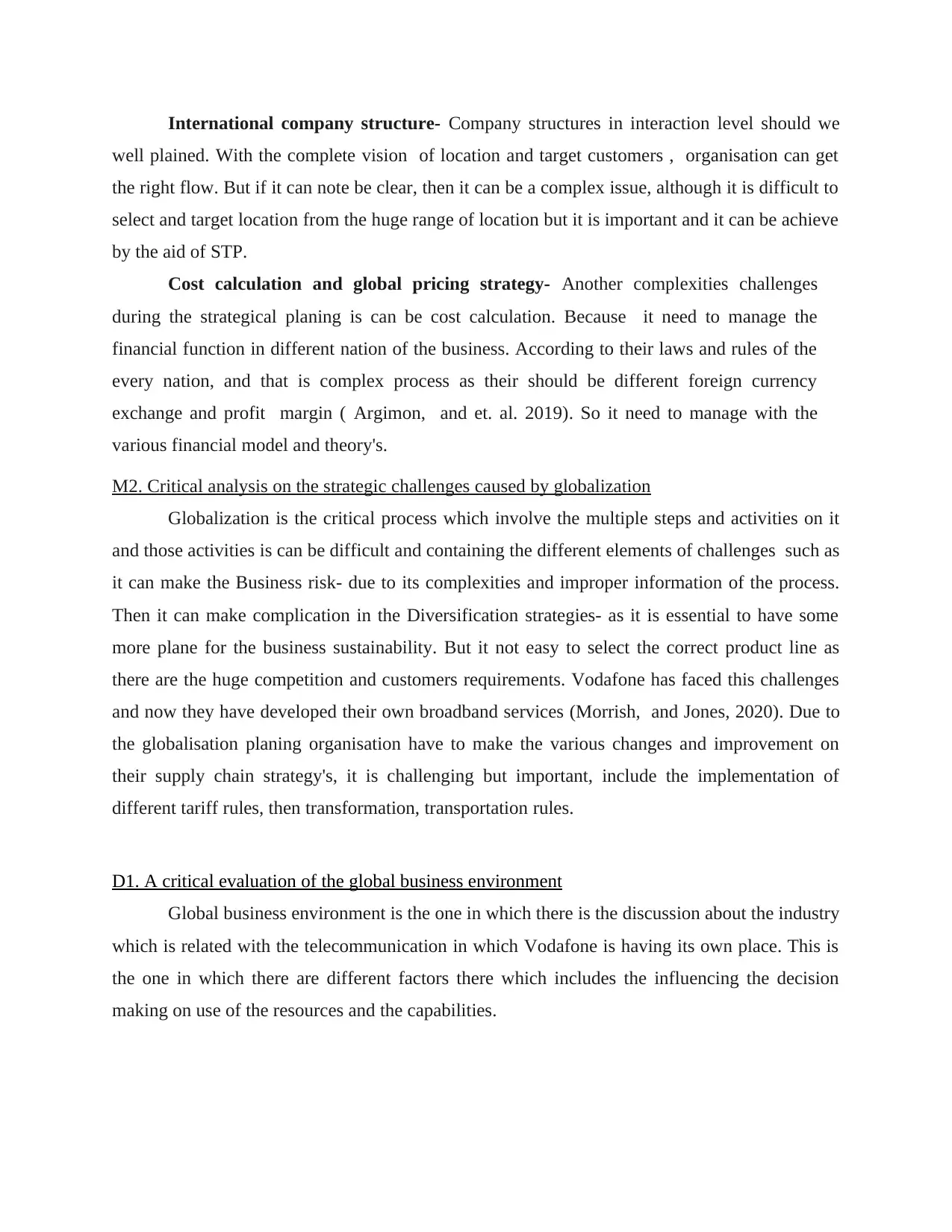
International company structure- Company structures in interaction level should we
well plained. With the complete vision of location and target customers , organisation can get
the right flow. But if it can note be clear, then it can be a complex issue, although it is difficult to
select and target location from the huge range of location but it is important and it can be achieve
by the aid of STP.
Cost calculation and global pricing strategy- Another complexities challenges
during the strategical planing is can be cost calculation. Because it need to manage the
financial function in different nation of the business. According to their laws and rules of the
every nation, and that is complex process as their should be different foreign currency
exchange and profit margin ( Argimon, and et. al. 2019). So it need to manage with the
various financial model and theory's.
M2. Critical analysis on the strategic challenges caused by globalization
Globalization is the critical process which involve the multiple steps and activities on it
and those activities is can be difficult and containing the different elements of challenges such as
it can make the Business risk- due to its complexities and improper information of the process.
Then it can make complication in the Diversification strategies- as it is essential to have some
more plane for the business sustainability. But it not easy to select the correct product line as
there are the huge competition and customers requirements. Vodafone has faced this challenges
and now they have developed their own broadband services (Morrish, and Jones, 2020). Due to
the globalisation planing organisation have to make the various changes and improvement on
their supply chain strategy's, it is challenging but important, include the implementation of
different tariff rules, then transformation, transportation rules.
D1. A critical evaluation of the global business environment
Global business environment is the one in which there is the discussion about the industry
which is related with the telecommunication in which Vodafone is having its own place. This is
the one in which there are different factors there which includes the influencing the decision
making on use of the resources and the capabilities.
well plained. With the complete vision of location and target customers , organisation can get
the right flow. But if it can note be clear, then it can be a complex issue, although it is difficult to
select and target location from the huge range of location but it is important and it can be achieve
by the aid of STP.
Cost calculation and global pricing strategy- Another complexities challenges
during the strategical planing is can be cost calculation. Because it need to manage the
financial function in different nation of the business. According to their laws and rules of the
every nation, and that is complex process as their should be different foreign currency
exchange and profit margin ( Argimon, and et. al. 2019). So it need to manage with the
various financial model and theory's.
M2. Critical analysis on the strategic challenges caused by globalization
Globalization is the critical process which involve the multiple steps and activities on it
and those activities is can be difficult and containing the different elements of challenges such as
it can make the Business risk- due to its complexities and improper information of the process.
Then it can make complication in the Diversification strategies- as it is essential to have some
more plane for the business sustainability. But it not easy to select the correct product line as
there are the huge competition and customers requirements. Vodafone has faced this challenges
and now they have developed their own broadband services (Morrish, and Jones, 2020). Due to
the globalisation planing organisation have to make the various changes and improvement on
their supply chain strategy's, it is challenging but important, include the implementation of
different tariff rules, then transformation, transportation rules.
D1. A critical evaluation of the global business environment
Global business environment is the one in which there is the discussion about the industry
which is related with the telecommunication in which Vodafone is having its own place. This is
the one in which there are different factors there which includes the influencing the decision
making on use of the resources and the capabilities.
⊘ This is a preview!⊘
Do you want full access?
Subscribe today to unlock all pages.

Trusted by 1+ million students worldwide
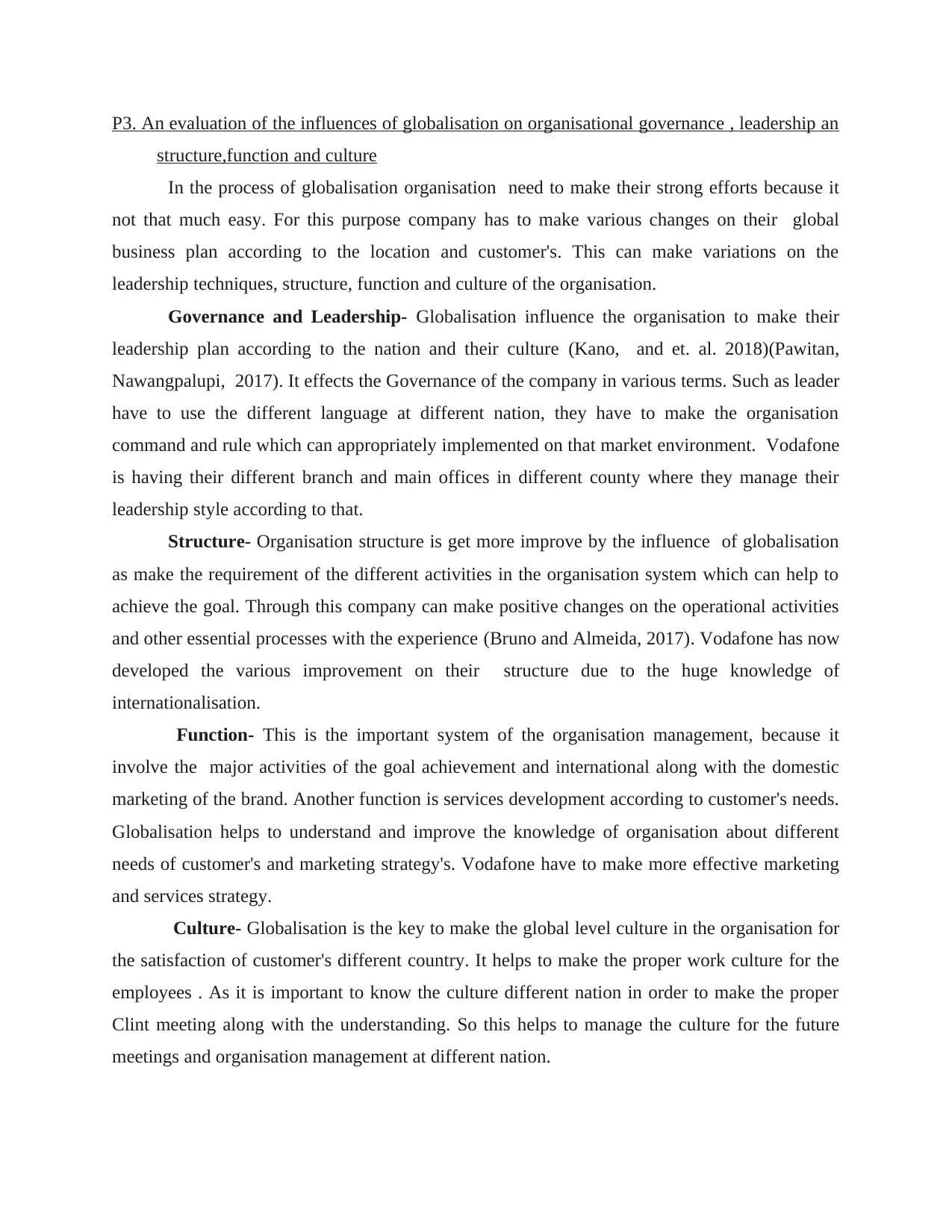
P3. An evaluation of the influences of globalisation on organisational governance , leadership an
structure,function and culture
In the process of globalisation organisation need to make their strong efforts because it
not that much easy. For this purpose company has to make various changes on their global
business plan according to the location and customer's. This can make variations on the
leadership techniques, structure, function and culture of the organisation.
Governance and Leadership- Globalisation influence the organisation to make their
leadership plan according to the nation and their culture (Kano, and et. al. 2018)(Pawitan,
Nawangpalupi, 2017). It effects the Governance of the company in various terms. Such as leader
have to use the different language at different nation, they have to make the organisation
command and rule which can appropriately implemented on that market environment. Vodafone
is having their different branch and main offices in different county where they manage their
leadership style according to that.
Structure- Organisation structure is get more improve by the influence of globalisation
as make the requirement of the different activities in the organisation system which can help to
achieve the goal. Through this company can make positive changes on the operational activities
and other essential processes with the experience (Bruno and Almeida, 2017). Vodafone has now
developed the various improvement on their structure due to the huge knowledge of
internationalisation.
Function- This is the important system of the organisation management, because it
involve the major activities of the goal achievement and international along with the domestic
marketing of the brand. Another function is services development according to customer's needs.
Globalisation helps to understand and improve the knowledge of organisation about different
needs of customer's and marketing strategy's. Vodafone have to make more effective marketing
and services strategy.
Culture- Globalisation is the key to make the global level culture in the organisation for
the satisfaction of customer's different country. It helps to make the proper work culture for the
employees . As it is important to know the culture different nation in order to make the proper
Clint meeting along with the understanding. So this helps to manage the culture for the future
meetings and organisation management at different nation.
structure,function and culture
In the process of globalisation organisation need to make their strong efforts because it
not that much easy. For this purpose company has to make various changes on their global
business plan according to the location and customer's. This can make variations on the
leadership techniques, structure, function and culture of the organisation.
Governance and Leadership- Globalisation influence the organisation to make their
leadership plan according to the nation and their culture (Kano, and et. al. 2018)(Pawitan,
Nawangpalupi, 2017). It effects the Governance of the company in various terms. Such as leader
have to use the different language at different nation, they have to make the organisation
command and rule which can appropriately implemented on that market environment. Vodafone
is having their different branch and main offices in different county where they manage their
leadership style according to that.
Structure- Organisation structure is get more improve by the influence of globalisation
as make the requirement of the different activities in the organisation system which can help to
achieve the goal. Through this company can make positive changes on the operational activities
and other essential processes with the experience (Bruno and Almeida, 2017). Vodafone has now
developed the various improvement on their structure due to the huge knowledge of
internationalisation.
Function- This is the important system of the organisation management, because it
involve the major activities of the goal achievement and international along with the domestic
marketing of the brand. Another function is services development according to customer's needs.
Globalisation helps to understand and improve the knowledge of organisation about different
needs of customer's and marketing strategy's. Vodafone have to make more effective marketing
and services strategy.
Culture- Globalisation is the key to make the global level culture in the organisation for
the satisfaction of customer's different country. It helps to make the proper work culture for the
employees . As it is important to know the culture different nation in order to make the proper
Clint meeting along with the understanding. So this helps to manage the culture for the future
meetings and organisation management at different nation.
Paraphrase This Document
Need a fresh take? Get an instant paraphrase of this document with our AI Paraphraser
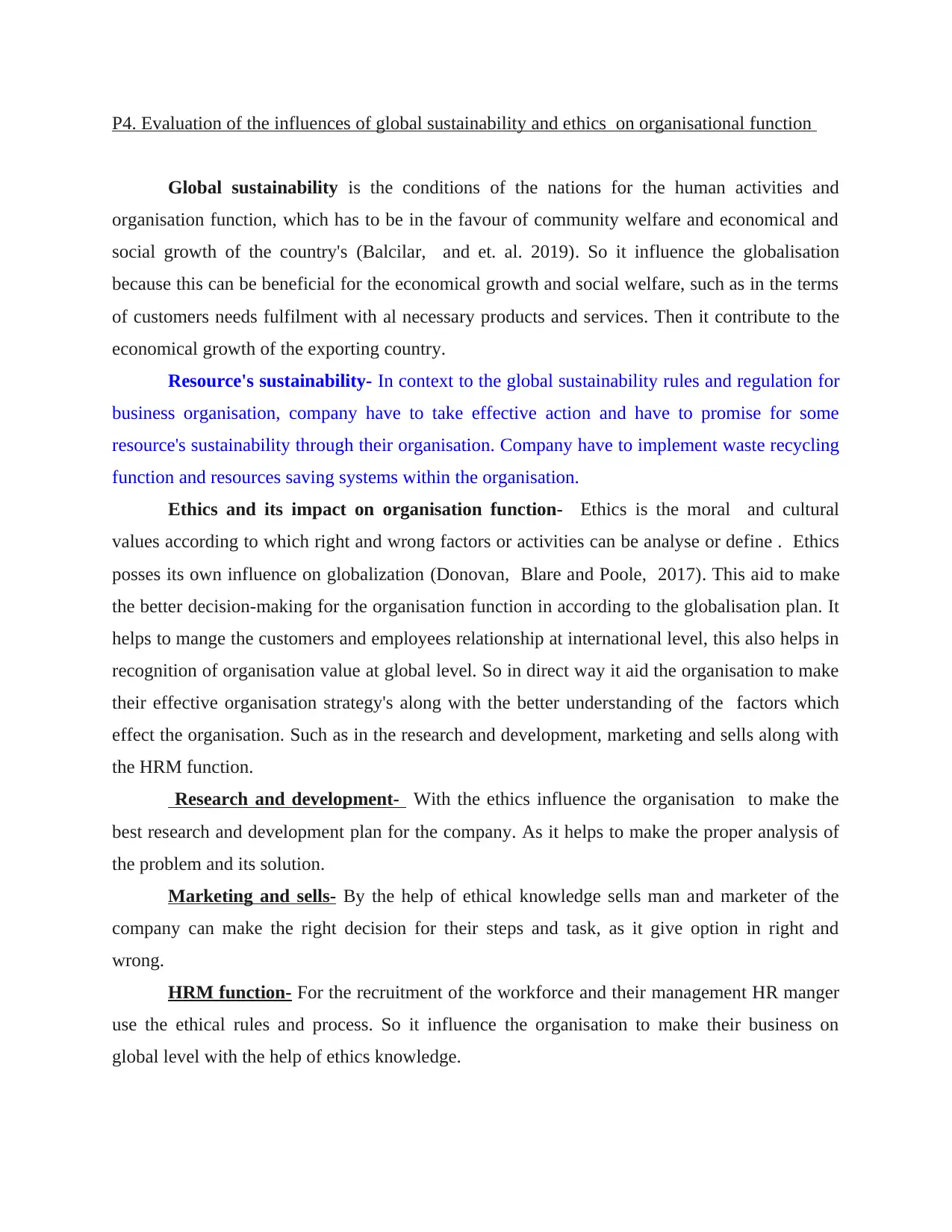
P4. Evaluation of the influences of global sustainability and ethics on organisational function
Global sustainability is the conditions of the nations for the human activities and
organisation function, which has to be in the favour of community welfare and economical and
social growth of the country's (Balcilar, and et. al. 2019). So it influence the globalisation
because this can be beneficial for the economical growth and social welfare, such as in the terms
of customers needs fulfilment with al necessary products and services. Then it contribute to the
economical growth of the exporting country.
Resource's sustainability- In context to the global sustainability rules and regulation for
business organisation, company have to take effective action and have to promise for some
resource's sustainability through their organisation. Company have to implement waste recycling
function and resources saving systems within the organisation.
Ethics and its impact on organisation function- Ethics is the moral and cultural
values according to which right and wrong factors or activities can be analyse or define . Ethics
posses its own influence on globalization (Donovan, Blare and Poole, 2017). This aid to make
the better decision-making for the organisation function in according to the globalisation plan. It
helps to mange the customers and employees relationship at international level, this also helps in
recognition of organisation value at global level. So in direct way it aid the organisation to make
their effective organisation strategy's along with the better understanding of the factors which
effect the organisation. Such as in the research and development, marketing and sells along with
the HRM function.
Research and development- With the ethics influence the organisation to make the
best research and development plan for the company. As it helps to make the proper analysis of
the problem and its solution.
Marketing and sells- By the help of ethical knowledge sells man and marketer of the
company can make the right decision for their steps and task, as it give option in right and
wrong.
HRM function- For the recruitment of the workforce and their management HR manger
use the ethical rules and process. So it influence the organisation to make their business on
global level with the help of ethics knowledge.
Global sustainability is the conditions of the nations for the human activities and
organisation function, which has to be in the favour of community welfare and economical and
social growth of the country's (Balcilar, and et. al. 2019). So it influence the globalisation
because this can be beneficial for the economical growth and social welfare, such as in the terms
of customers needs fulfilment with al necessary products and services. Then it contribute to the
economical growth of the exporting country.
Resource's sustainability- In context to the global sustainability rules and regulation for
business organisation, company have to take effective action and have to promise for some
resource's sustainability through their organisation. Company have to implement waste recycling
function and resources saving systems within the organisation.
Ethics and its impact on organisation function- Ethics is the moral and cultural
values according to which right and wrong factors or activities can be analyse or define . Ethics
posses its own influence on globalization (Donovan, Blare and Poole, 2017). This aid to make
the better decision-making for the organisation function in according to the globalisation plan. It
helps to mange the customers and employees relationship at international level, this also helps in
recognition of organisation value at global level. So in direct way it aid the organisation to make
their effective organisation strategy's along with the better understanding of the factors which
effect the organisation. Such as in the research and development, marketing and sells along with
the HRM function.
Research and development- With the ethics influence the organisation to make the
best research and development plan for the company. As it helps to make the proper analysis of
the problem and its solution.
Marketing and sells- By the help of ethical knowledge sells man and marketer of the
company can make the right decision for their steps and task, as it give option in right and
wrong.
HRM function- For the recruitment of the workforce and their management HR manger
use the ethical rules and process. So it influence the organisation to make their business on
global level with the help of ethics knowledge.
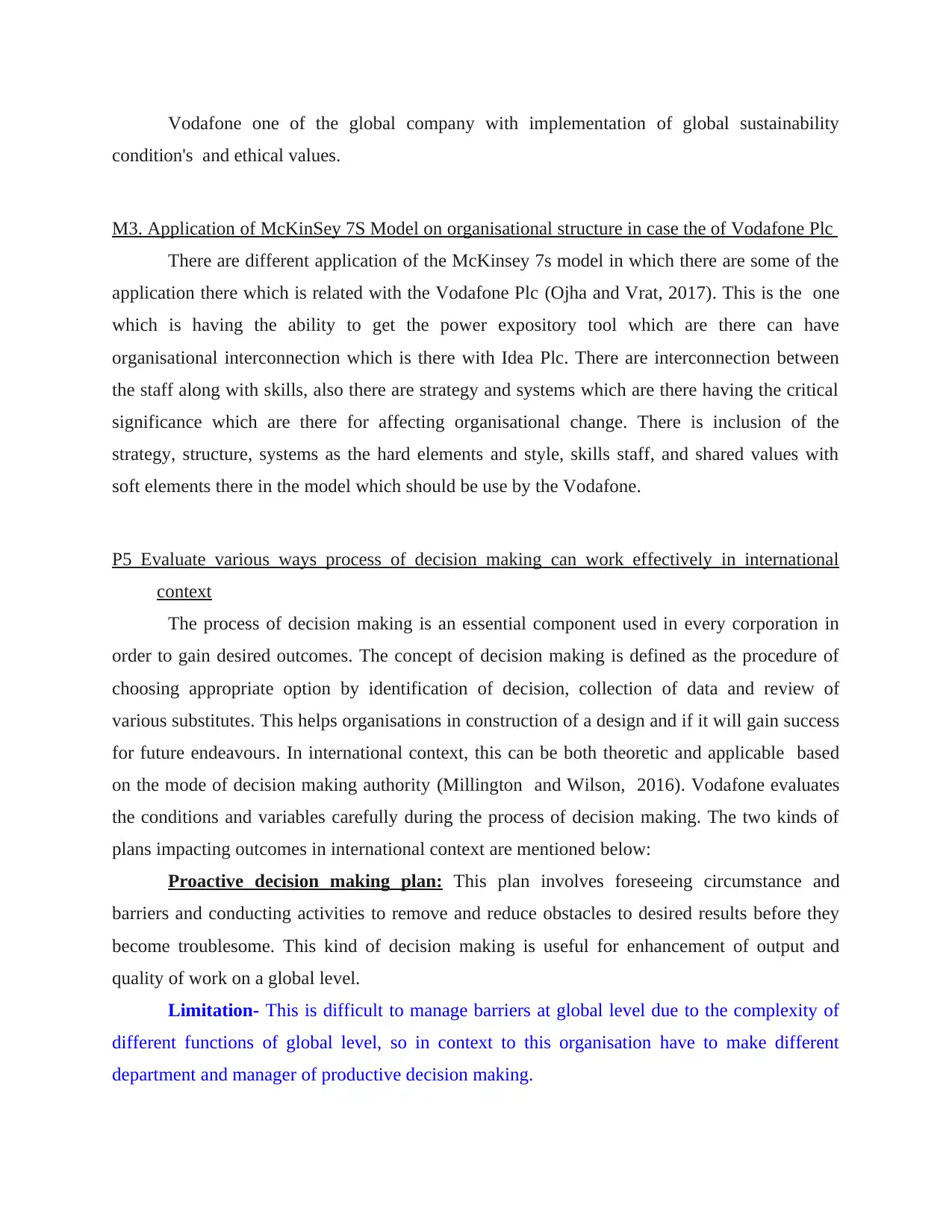
Vodafone one of the global company with implementation of global sustainability
condition's and ethical values.
M3. Application of McKinSey 7S Model on organisational structure in case the of Vodafone Plc
There are different application of the McKinsey 7s model in which there are some of the
application there which is related with the Vodafone Plc (Ojha and Vrat, 2017). This is the one
which is having the ability to get the power expository tool which are there can have
organisational interconnection which is there with Idea Plc. There are interconnection between
the staff along with skills, also there are strategy and systems which are there having the critical
significance which are there for affecting organisational change. There is inclusion of the
strategy, structure, systems as the hard elements and style, skills staff, and shared values with
soft elements there in the model which should be use by the Vodafone.
P5 Evaluate various ways process of decision making can work effectively in international
context
The process of decision making is an essential component used in every corporation in
order to gain desired outcomes. The concept of decision making is defined as the procedure of
choosing appropriate option by identification of decision, collection of data and review of
various substitutes. This helps organisations in construction of a design and if it will gain success
for future endeavours. In international context, this can be both theoretic and applicable based
on the mode of decision making authority (Millington and Wilson, 2016). Vodafone evaluates
the conditions and variables carefully during the process of decision making. The two kinds of
plans impacting outcomes in international context are mentioned below:
Proactive decision making plan: This plan involves foreseeing circumstance and
barriers and conducting activities to remove and reduce obstacles to desired results before they
become troublesome. This kind of decision making is useful for enhancement of output and
quality of work on a global level.
Limitation- This is difficult to manage barriers at global level due to the complexity of
different functions of global level, so in context to this organisation have to make different
department and manager of productive decision making.
condition's and ethical values.
M3. Application of McKinSey 7S Model on organisational structure in case the of Vodafone Plc
There are different application of the McKinsey 7s model in which there are some of the
application there which is related with the Vodafone Plc (Ojha and Vrat, 2017). This is the one
which is having the ability to get the power expository tool which are there can have
organisational interconnection which is there with Idea Plc. There are interconnection between
the staff along with skills, also there are strategy and systems which are there having the critical
significance which are there for affecting organisational change. There is inclusion of the
strategy, structure, systems as the hard elements and style, skills staff, and shared values with
soft elements there in the model which should be use by the Vodafone.
P5 Evaluate various ways process of decision making can work effectively in international
context
The process of decision making is an essential component used in every corporation in
order to gain desired outcomes. The concept of decision making is defined as the procedure of
choosing appropriate option by identification of decision, collection of data and review of
various substitutes. This helps organisations in construction of a design and if it will gain success
for future endeavours. In international context, this can be both theoretic and applicable based
on the mode of decision making authority (Millington and Wilson, 2016). Vodafone evaluates
the conditions and variables carefully during the process of decision making. The two kinds of
plans impacting outcomes in international context are mentioned below:
Proactive decision making plan: This plan involves foreseeing circumstance and
barriers and conducting activities to remove and reduce obstacles to desired results before they
become troublesome. This kind of decision making is useful for enhancement of output and
quality of work on a global level.
Limitation- This is difficult to manage barriers at global level due to the complexity of
different functions of global level, so in context to this organisation have to make different
department and manager of productive decision making.
⊘ This is a preview!⊘
Do you want full access?
Subscribe today to unlock all pages.

Trusted by 1+ million students worldwide
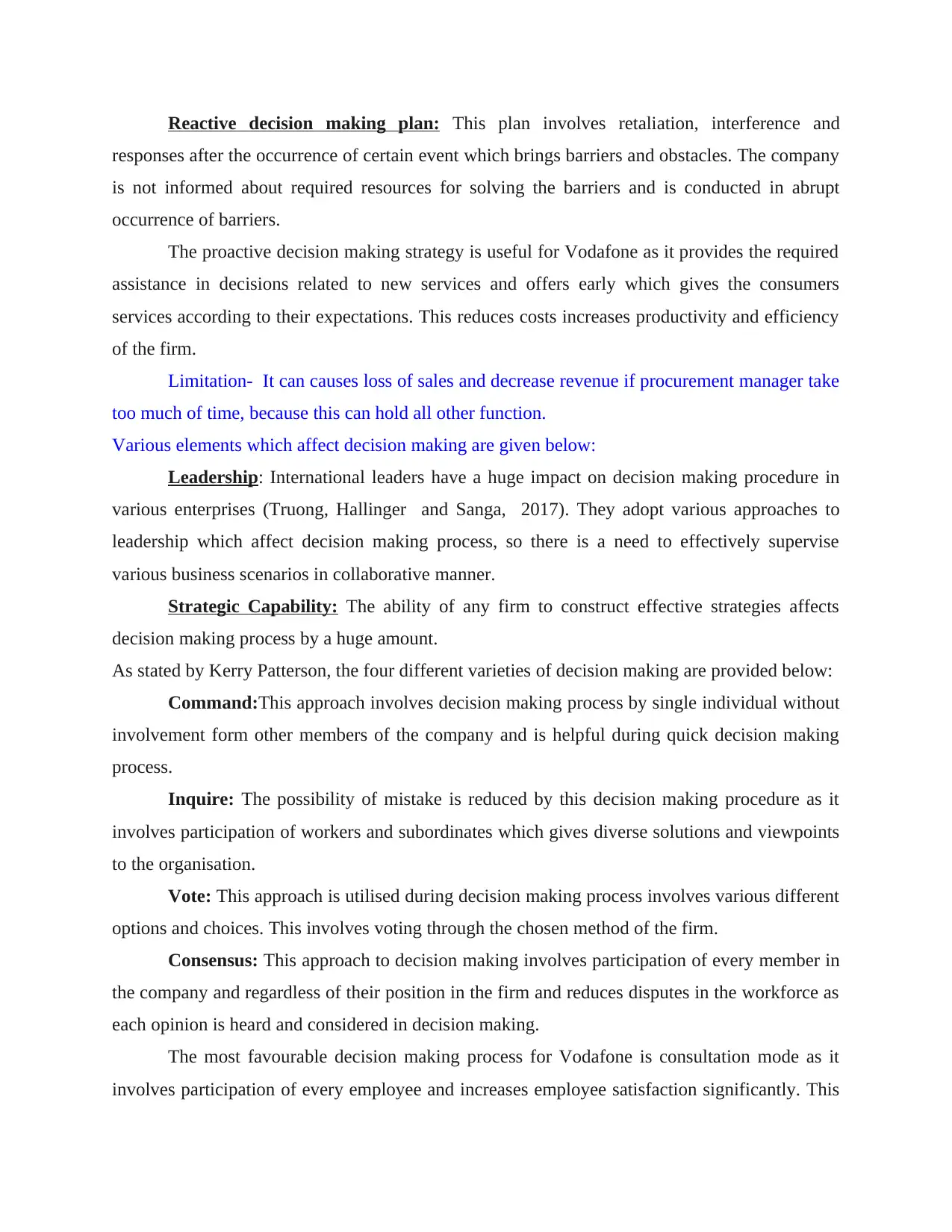
Reactive decision making plan: This plan involves retaliation, interference and
responses after the occurrence of certain event which brings barriers and obstacles. The company
is not informed about required resources for solving the barriers and is conducted in abrupt
occurrence of barriers.
The proactive decision making strategy is useful for Vodafone as it provides the required
assistance in decisions related to new services and offers early which gives the consumers
services according to their expectations. This reduces costs increases productivity and efficiency
of the firm.
Limitation- It can causes loss of sales and decrease revenue if procurement manager take
too much of time, because this can hold all other function.
Various elements which affect decision making are given below:
Leadership: International leaders have a huge impact on decision making procedure in
various enterprises (Truong, Hallinger and Sanga, 2017). They adopt various approaches to
leadership which affect decision making process, so there is a need to effectively supervise
various business scenarios in collaborative manner.
Strategic Capability: The ability of any firm to construct effective strategies affects
decision making process by a huge amount.
As stated by Kerry Patterson, the four different varieties of decision making are provided below:
Command:This approach involves decision making process by single individual without
involvement form other members of the company and is helpful during quick decision making
process.
Inquire: The possibility of mistake is reduced by this decision making procedure as it
involves participation of workers and subordinates which gives diverse solutions and viewpoints
to the organisation.
Vote: This approach is utilised during decision making process involves various different
options and choices. This involves voting through the chosen method of the firm.
Consensus: This approach to decision making involves participation of every member in
the company and regardless of their position in the firm and reduces disputes in the workforce as
each opinion is heard and considered in decision making.
The most favourable decision making process for Vodafone is consultation mode as it
involves participation of every employee and increases employee satisfaction significantly. This
responses after the occurrence of certain event which brings barriers and obstacles. The company
is not informed about required resources for solving the barriers and is conducted in abrupt
occurrence of barriers.
The proactive decision making strategy is useful for Vodafone as it provides the required
assistance in decisions related to new services and offers early which gives the consumers
services according to their expectations. This reduces costs increases productivity and efficiency
of the firm.
Limitation- It can causes loss of sales and decrease revenue if procurement manager take
too much of time, because this can hold all other function.
Various elements which affect decision making are given below:
Leadership: International leaders have a huge impact on decision making procedure in
various enterprises (Truong, Hallinger and Sanga, 2017). They adopt various approaches to
leadership which affect decision making process, so there is a need to effectively supervise
various business scenarios in collaborative manner.
Strategic Capability: The ability of any firm to construct effective strategies affects
decision making process by a huge amount.
As stated by Kerry Patterson, the four different varieties of decision making are provided below:
Command:This approach involves decision making process by single individual without
involvement form other members of the company and is helpful during quick decision making
process.
Inquire: The possibility of mistake is reduced by this decision making procedure as it
involves participation of workers and subordinates which gives diverse solutions and viewpoints
to the organisation.
Vote: This approach is utilised during decision making process involves various different
options and choices. This involves voting through the chosen method of the firm.
Consensus: This approach to decision making involves participation of every member in
the company and regardless of their position in the firm and reduces disputes in the workforce as
each opinion is heard and considered in decision making.
The most favourable decision making process for Vodafone is consultation mode as it
involves participation of every employee and increases employee satisfaction significantly. This
Paraphrase This Document
Need a fresh take? Get an instant paraphrase of this document with our AI Paraphraser
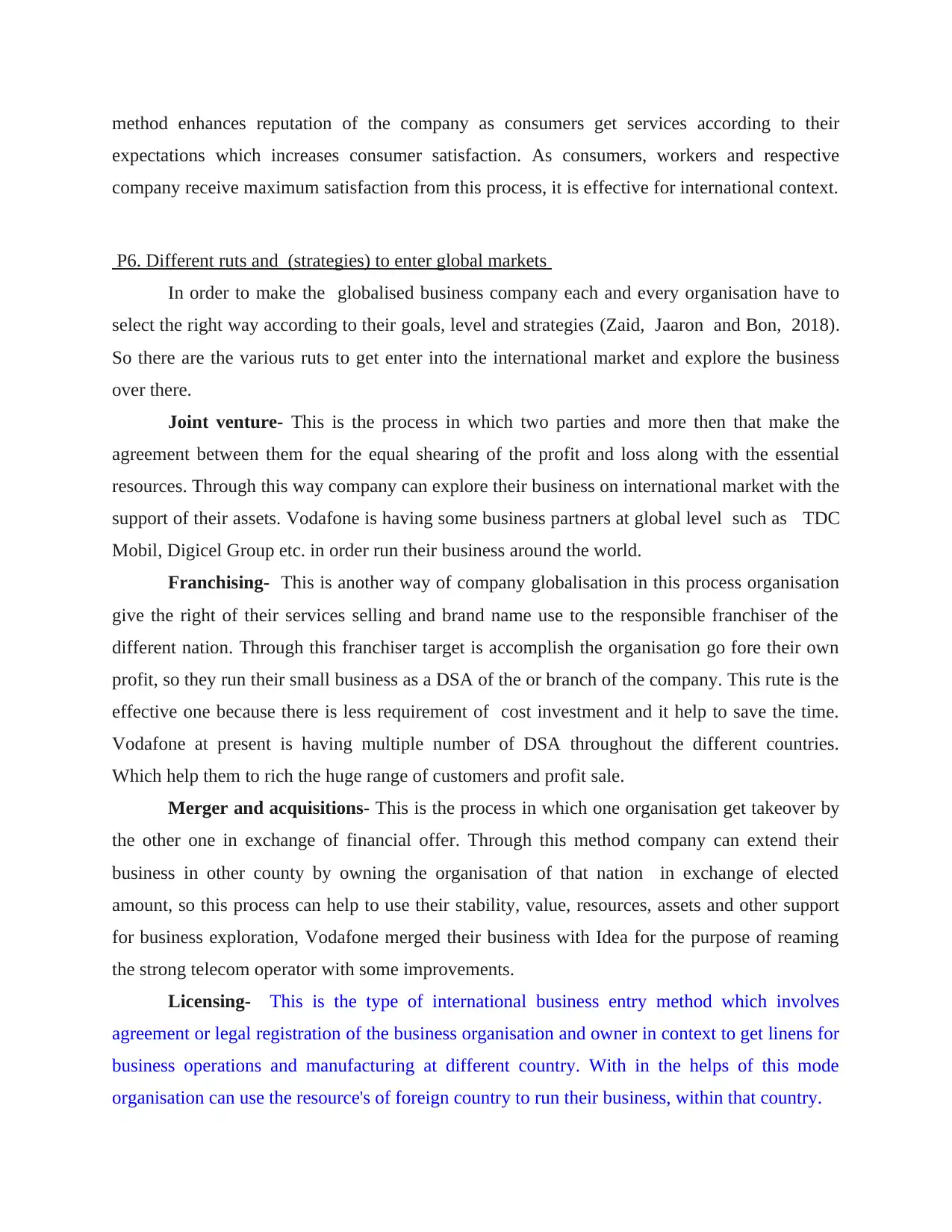
method enhances reputation of the company as consumers get services according to their
expectations which increases consumer satisfaction. As consumers, workers and respective
company receive maximum satisfaction from this process, it is effective for international context.
P6. Different ruts and (strategies) to enter global markets
In order to make the globalised business company each and every organisation have to
select the right way according to their goals, level and strategies (Zaid, Jaaron and Bon, 2018).
So there are the various ruts to get enter into the international market and explore the business
over there.
Joint venture- This is the process in which two parties and more then that make the
agreement between them for the equal shearing of the profit and loss along with the essential
resources. Through this way company can explore their business on international market with the
support of their assets. Vodafone is having some business partners at global level such as TDC
Mobil, Digicel Group etc. in order run their business around the world.
Franchising- This is another way of company globalisation in this process organisation
give the right of their services selling and brand name use to the responsible franchiser of the
different nation. Through this franchiser target is accomplish the organisation go fore their own
profit, so they run their small business as a DSA of the or branch of the company. This rute is the
effective one because there is less requirement of cost investment and it help to save the time.
Vodafone at present is having multiple number of DSA throughout the different countries.
Which help them to rich the huge range of customers and profit sale.
Merger and acquisitions- This is the process in which one organisation get takeover by
the other one in exchange of financial offer. Through this method company can extend their
business in other county by owning the organisation of that nation in exchange of elected
amount, so this process can help to use their stability, value, resources, assets and other support
for business exploration, Vodafone merged their business with Idea for the purpose of reaming
the strong telecom operator with some improvements.
Licensing- This is the type of international business entry method which involves
agreement or legal registration of the business organisation and owner in context to get linens for
business operations and manufacturing at different country. With in the helps of this mode
organisation can use the resource's of foreign country to run their business, within that country.
expectations which increases consumer satisfaction. As consumers, workers and respective
company receive maximum satisfaction from this process, it is effective for international context.
P6. Different ruts and (strategies) to enter global markets
In order to make the globalised business company each and every organisation have to
select the right way according to their goals, level and strategies (Zaid, Jaaron and Bon, 2018).
So there are the various ruts to get enter into the international market and explore the business
over there.
Joint venture- This is the process in which two parties and more then that make the
agreement between them for the equal shearing of the profit and loss along with the essential
resources. Through this way company can explore their business on international market with the
support of their assets. Vodafone is having some business partners at global level such as TDC
Mobil, Digicel Group etc. in order run their business around the world.
Franchising- This is another way of company globalisation in this process organisation
give the right of their services selling and brand name use to the responsible franchiser of the
different nation. Through this franchiser target is accomplish the organisation go fore their own
profit, so they run their small business as a DSA of the or branch of the company. This rute is the
effective one because there is less requirement of cost investment and it help to save the time.
Vodafone at present is having multiple number of DSA throughout the different countries.
Which help them to rich the huge range of customers and profit sale.
Merger and acquisitions- This is the process in which one organisation get takeover by
the other one in exchange of financial offer. Through this method company can extend their
business in other county by owning the organisation of that nation in exchange of elected
amount, so this process can help to use their stability, value, resources, assets and other support
for business exploration, Vodafone merged their business with Idea for the purpose of reaming
the strong telecom operator with some improvements.
Licensing- This is the type of international business entry method which involves
agreement or legal registration of the business organisation and owner in context to get linens for
business operations and manufacturing at different country. With in the helps of this mode
organisation can use the resource's of foreign country to run their business, within that country.
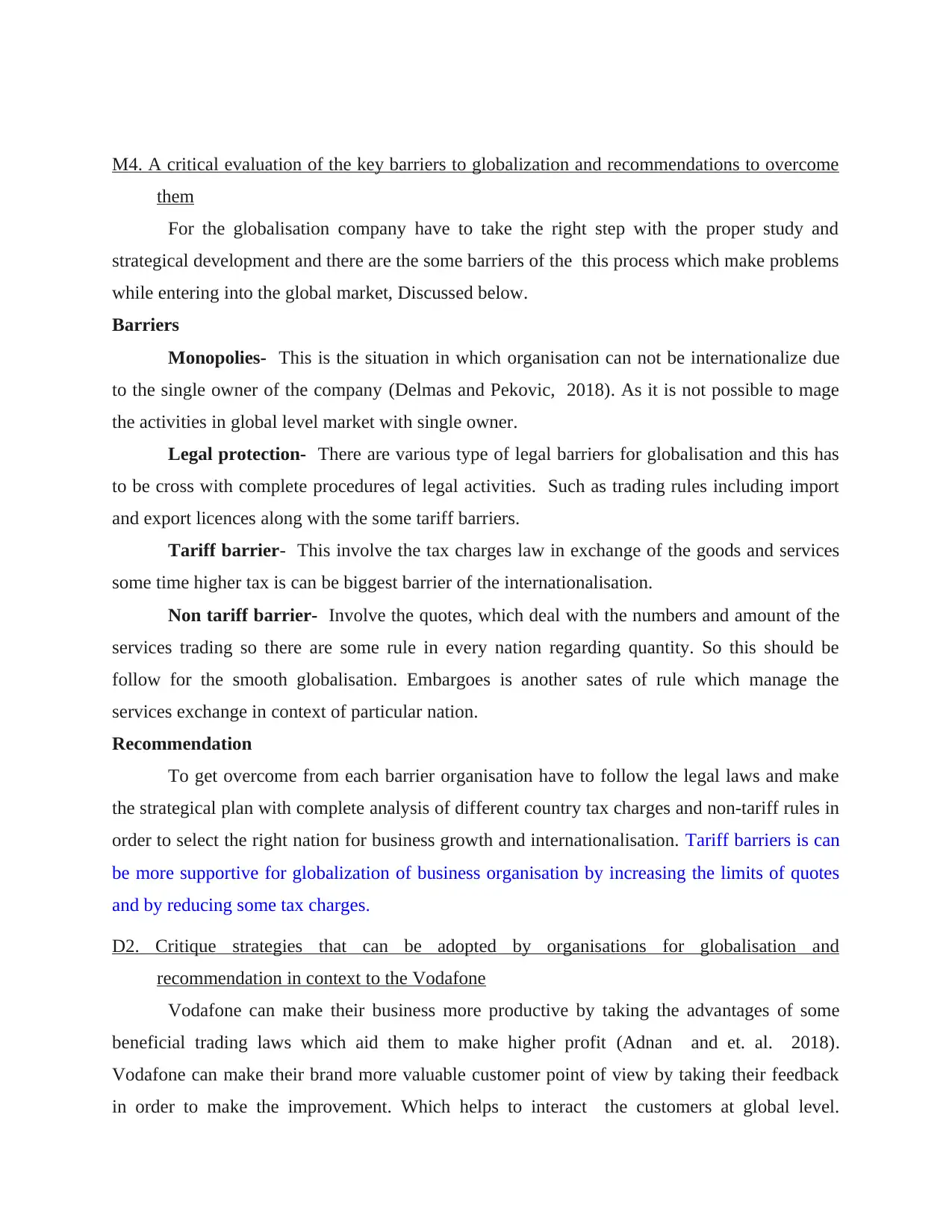
M4. A critical evaluation of the key barriers to globalization and recommendations to overcome
them
For the globalisation company have to take the right step with the proper study and
strategical development and there are the some barriers of the this process which make problems
while entering into the global market, Discussed below.
Barriers
Monopolies- This is the situation in which organisation can not be internationalize due
to the single owner of the company (Delmas and Pekovic, 2018). As it is not possible to mage
the activities in global level market with single owner.
Legal protection- There are various type of legal barriers for globalisation and this has
to be cross with complete procedures of legal activities. Such as trading rules including import
and export licences along with the some tariff barriers.
Tariff barrier- This involve the tax charges law in exchange of the goods and services
some time higher tax is can be biggest barrier of the internationalisation.
Non tariff barrier- Involve the quotes, which deal with the numbers and amount of the
services trading so there are some rule in every nation regarding quantity. So this should be
follow for the smooth globalisation. Embargoes is another sates of rule which manage the
services exchange in context of particular nation.
Recommendation
To get overcome from each barrier organisation have to follow the legal laws and make
the strategical plan with complete analysis of different country tax charges and non-tariff rules in
order to select the right nation for business growth and internationalisation. Tariff barriers is can
be more supportive for globalization of business organisation by increasing the limits of quotes
and by reducing some tax charges.
D2. Critique strategies that can be adopted by organisations for globalisation and
recommendation in context to the Vodafone
Vodafone can make their business more productive by taking the advantages of some
beneficial trading laws which aid them to make higher profit (Adnan and et. al. 2018).
Vodafone can make their brand more valuable customer point of view by taking their feedback
in order to make the improvement. Which helps to interact the customers at global level.
them
For the globalisation company have to take the right step with the proper study and
strategical development and there are the some barriers of the this process which make problems
while entering into the global market, Discussed below.
Barriers
Monopolies- This is the situation in which organisation can not be internationalize due
to the single owner of the company (Delmas and Pekovic, 2018). As it is not possible to mage
the activities in global level market with single owner.
Legal protection- There are various type of legal barriers for globalisation and this has
to be cross with complete procedures of legal activities. Such as trading rules including import
and export licences along with the some tariff barriers.
Tariff barrier- This involve the tax charges law in exchange of the goods and services
some time higher tax is can be biggest barrier of the internationalisation.
Non tariff barrier- Involve the quotes, which deal with the numbers and amount of the
services trading so there are some rule in every nation regarding quantity. So this should be
follow for the smooth globalisation. Embargoes is another sates of rule which manage the
services exchange in context of particular nation.
Recommendation
To get overcome from each barrier organisation have to follow the legal laws and make
the strategical plan with complete analysis of different country tax charges and non-tariff rules in
order to select the right nation for business growth and internationalisation. Tariff barriers is can
be more supportive for globalization of business organisation by increasing the limits of quotes
and by reducing some tax charges.
D2. Critique strategies that can be adopted by organisations for globalisation and
recommendation in context to the Vodafone
Vodafone can make their business more productive by taking the advantages of some
beneficial trading laws which aid them to make higher profit (Adnan and et. al. 2018).
Vodafone can make their brand more valuable customer point of view by taking their feedback
in order to make the improvement. Which helps to interact the customers at global level.
⊘ This is a preview!⊘
Do you want full access?
Subscribe today to unlock all pages.

Trusted by 1+ million students worldwide
1 out of 15
Related Documents
Your All-in-One AI-Powered Toolkit for Academic Success.
+13062052269
info@desklib.com
Available 24*7 on WhatsApp / Email
![[object Object]](/_next/static/media/star-bottom.7253800d.svg)
Unlock your academic potential
Copyright © 2020–2025 A2Z Services. All Rights Reserved. Developed and managed by ZUCOL.



